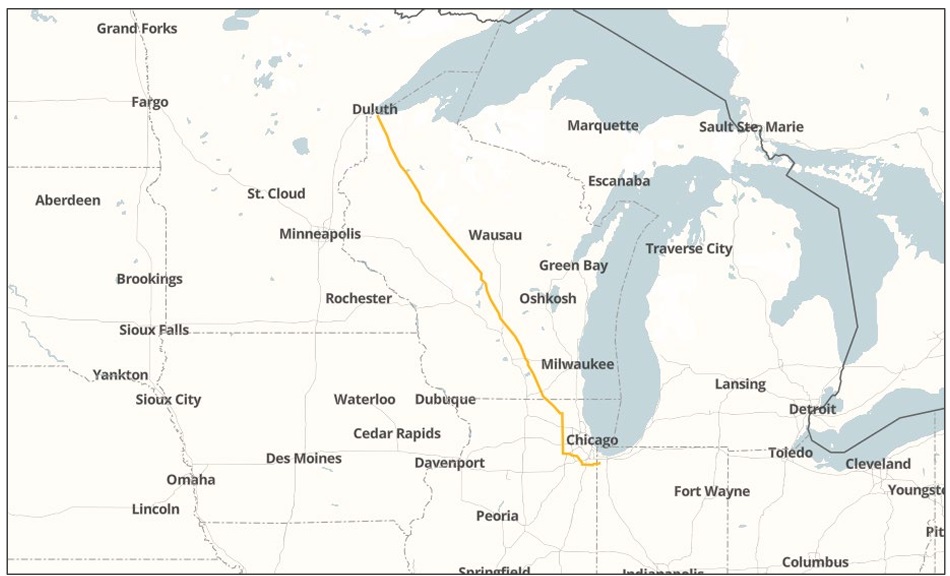
Enbridge estimates 1,650 bbl have leaked from its Line 6 before repair, an incident that has given fodder to opponents of another Enbridge project. (Source: Shutterstock.com)
A spill on Enbridge’s Line 6 in Wisconsin has brought the attention of the state government as well as opponents of the midstream company’s Line 5 project.
On Nov. 11, the Canadian-based midstream company notified the Wisconsin Department of Natural Resources (DNR) of a crude oil spill on Line 6 in the small town of Oakland.
After the initial investigation, Enbridge estimated the spill volume to amount to as much as 3 bbl of crude. The midstream company also initiated a soil and groundwater investigation into the area surrounding the leak.
On Dec. 13, Enbridge revised the estimated spill up to as many “1,650 barrels based on filed investigation, observations and data available at the time,” the Wisconsin DNR said in a statement. Investigators with the state said the size of the spill may change again as investigations continue.
Enbridge did not immediately respond to a Hart Energy request for comment.
The company is responsible for damages related to the spill, and the DNR is considering “appropriate next steps, including any potential enforcement actions such as a corrective action order,” according to the statement from the agency.
Enbridge is continuing to evaluate the spill and report results to the state. A Dec. 18 report showed nearby residential well systems had not been contaminated.
Line 6 is a 465-mile, 34-inch crude pipeline with 667,000 bbl/d capacity. It connects to Enbridge’s Superior Terminal on Lake Superior in northwestern Wisconsin and terminates near Griffith, Indiana, south of Chicago.

Some environmentalists, including activist group Midwest Environmental Advocates (MEA), pointed to the Line 6 spill as a reason to prevent Enbridge from completing its Line 5 rerouting project, which has been a controversial subject in several states, including Wisconsin, where the state recently issued permits.
“The close to 70,000 gallons of leaking crude oil from Enbridge’s Line 6 in Jefferson County shows why MEA has challenged DNR’s approval of the Line 5 reroute, and why we have specifically challenged DNR’s conclusion that the risk of a Line 5 spill is small,” MEA said in a statement.
Recommended Reading
E&Ps Pivot from the Pricey Permian
2025-02-01 - SM Energy, Ovintiv and Devon Energy were rumored to be hunting for Permian M&A—but they ultimately inked deals in cheaper basins. Experts say it’s a trend to watch as producers shrug off high Permian prices for runway in the Williston, Eagle Ford, the Uinta and the Montney.
Tamboran, Falcon JV Plan Beetaloo Development Area of Up to 4.5MM Acres
2025-01-24 - A joint venture in the Beetalo Basin between Tamboran Resources Corp. and Falcon Oil & Gas could expand a strategic development spanning 4.52 million acres, Falcon said.
On The Market This Week (April 7, 2025)
2025-04-11 - Here is a roundup of marketed oil and gas leaseholds in the Permian, Uinta, Haynesville and Niobrara from select E&Ps for the week of April 7, 2025.
Blackstone Buys NatGas Plant in ‘Data Center Valley’ for $1B
2025-01-24 - Ares Management’s Potomac Energy Center, sited in Virginia near more than 130 data centers, is expected to see “significant further growth,” Blackstone Energy Transition Partners said.
Huddleston: Haynesville E&P Aethon Ready for LNG, AI and Even an IPO
2025-01-22 - Gordon Huddleston, president and partner of Aethon Energy, talks about well costs in the western Haynesville, prepping for LNG and AI power demand and the company’s readiness for an IPO— if the conditions are right.
Comments
Add new comment
This conversation is moderated according to Hart Energy community rules. Please read the rules before joining the discussion. If you’re experiencing any technical problems, please contact our customer care team.






